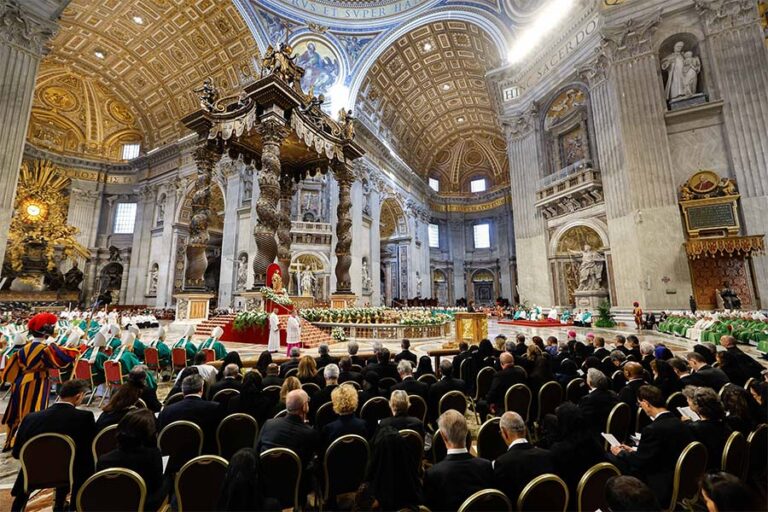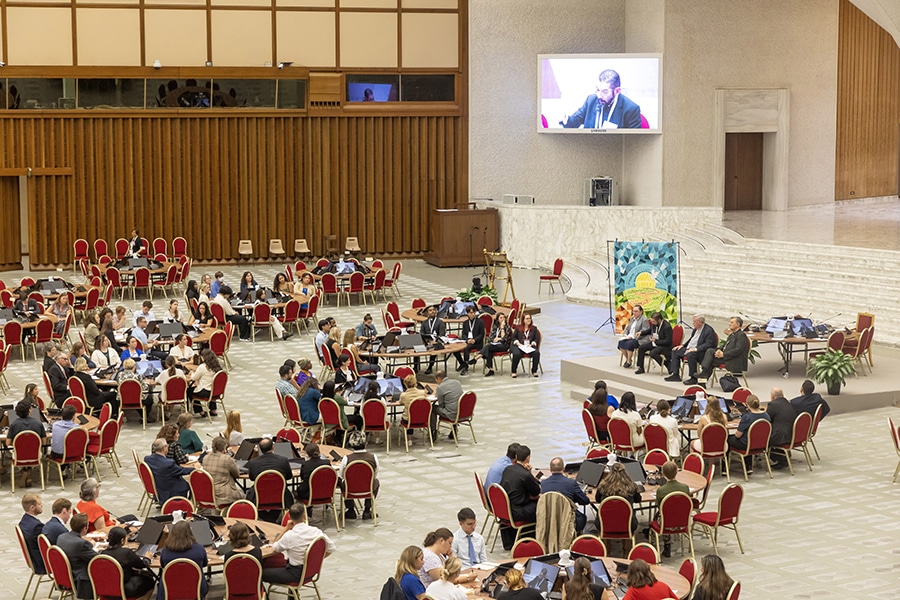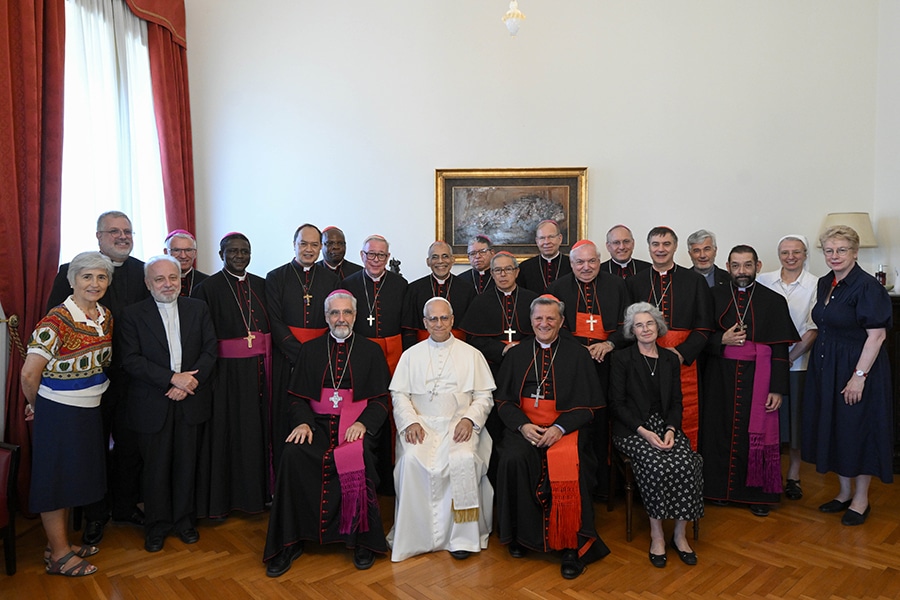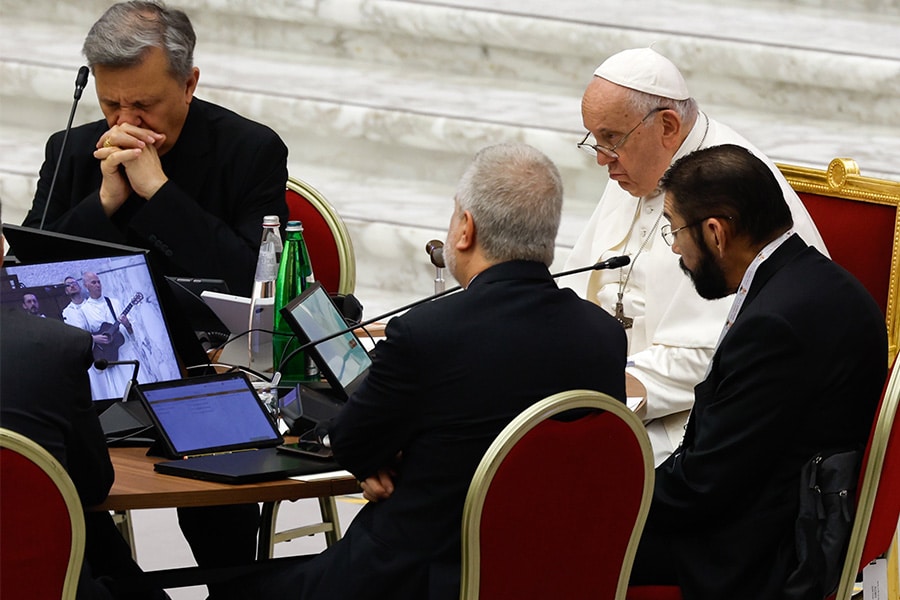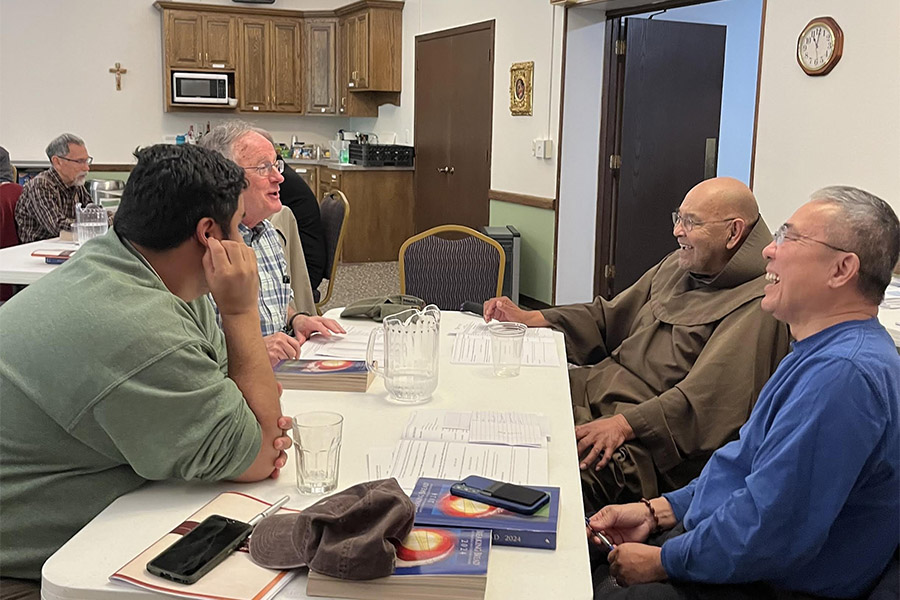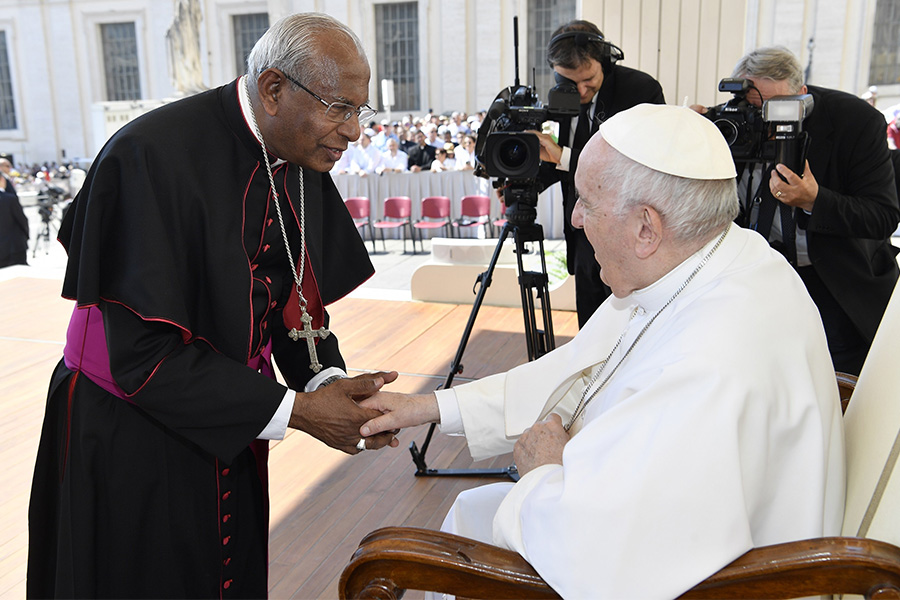Growth, undeniable tensions and “a deep desire to rebuild and strengthen” the body of Christ have emerged as key themes in the latest synod report for the Catholic Church in the U.S.
Released by the U.S. Conference of Catholic Bishops May 28, the “National Synthesis of the People of God in the United States of America for the Interim Stage of the 2021-2024 Synod” summarizes responses from more than 35,000 participants and over 1,000 listening sessions, with 76 percent of the nation’s dioceses and eparchies submitting reports to the U.S. synod team.
In addition, over 350 people met in some 15 listening sessions that focused on church life, social justice and vocations, while U.S. bishops also met for a synod listening session.
Launched by Pope Francis in October 2021, the first session of the 16th Ordinary General Assembly of the Synod of Bishops, organized around the theme “For a Synodal Church: Communion, Participation, Mission,” was held Oct. 4-29, 2023, in Rome.
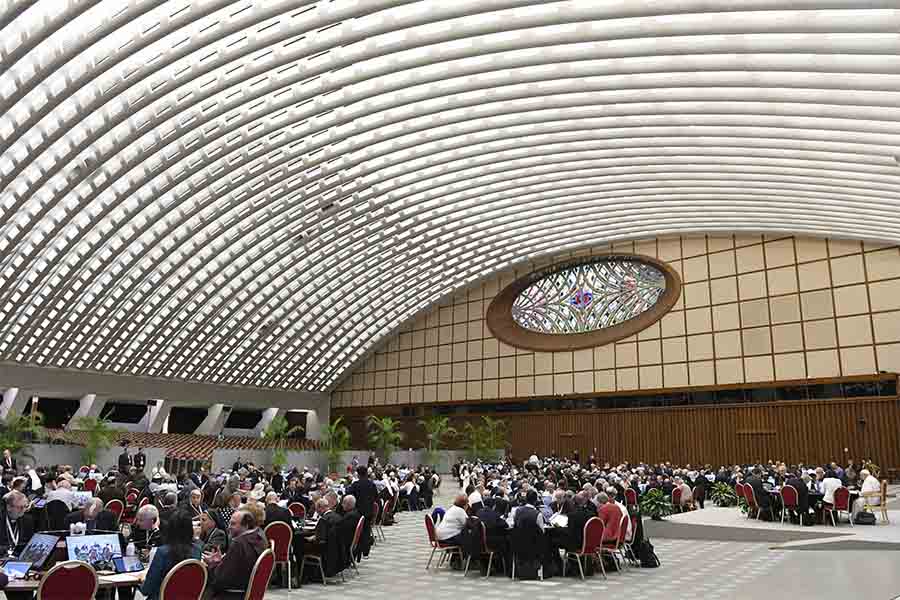
Ahead of the concluding session of the synod, which will take place in Rome in Oct. 2-27, dioceses across the U.S. were asked to hold additional listening sessions during Lent 2024, following a request from the Vatican’s Secretariat for the Synod of Bishops. Those responses were incorporated into the newly released synthesis.
“We had to be nimble with the Spirit,” U.S. synod team member Alexandra Carroll, who serves as the USCCB’s communications manager for social mission, told OSV News, adding that even with short notice of the extra sessions, “our diocesan synod leaders took it on and really owned the process.”
Fellow synod team members Richard Coll, executive director of the USCCB’s Department of Justice, Peace and Human Development, and the USCCB’s senior adviser for the synod Julia McStravog agreed.
Coll said he was “very, very taken by the commitment that was evident” in the responses to the listening sessions.
“The diocesan directors continue to be very devoted to this path,” he told OSV News. “It’s a wonderful thing to see, because it is now the third year of this process, but it didn’t seem … to me that there was any kind of ‘synod fatigue.’ People seem to be even more enthusiastic.”
“Synodality is really taking root,” said McStravog. “People are getting accustomed not only to sharing, but to listening in a deeper way.”
In his introduction to the synthesis, Bishop Daniel E. Flores of Brownsville, Texas — who serves as chairman of the USCCB’s Committee on Doctrine, and who has shepherded the synodal process in the U.S. — noted that “while no document could cover the full range of topics on the hearts and minds of Catholics” who took part in the listening sessions, the report showed the synodal journey has made progress in the U.S.
Among their insights, many of which were directly quoted in the report, participants expressed “two basic hopes for the church” — that it be both a “safe harbor” and a “fiery communion.”
As a “safe harbor,” the church can be a place “where the faithful are embraced, sustained and loved,” said the synthesis, citing one respondent who observed, “People come when they are broken. … At my parish, I feel I have a family there.”
That welcome must be more than “superficial,” the report said, pointing to parishes with numerous small communities and prayer groups as being “most successful” in reaching and integrating people from diverse backgrounds. With the church in the U.S. comprising “countless cultural and ethnic groups,” the report noted a desire “to promote interculturality, so that there is more unity between cultures that share the same church.”
At the same time, respondents described the church as a “fiery communion,” with the synodal process digging up a number of tensions within the church.
In particular, a lack of clear communication from church hierarchy and from media, both Catholic and secular, creates confusion and division over what it means to be Catholic — and hinders the church’s mission, said synod participants.
That uncertainty can be especially evident when trying to balance welcoming LGBTQ and other marginalized persons while making known the truths of the Catholic faith, said synod participants.
Catholic social teaching was “another area where division was keenly experienced,” with “conversations ‘on social justice and inclusion … filled with moments of profound pain and generational hurt,'” the report said. “Participants expressed concerns that the church has allowed the ongoing polarization and conflict (in civil society) to lead to a denial of the church’s social magisterium in many situations.”
The liturgy itself can be a flashpoint for tension, with the celebration of the Mass using the Roman Missal of 1962 (informally known as the “Latin Mass”) becoming “a focal point of broader debates about tradition, modernity, and the best ways to nurture faith across the diverse spectrum of Catholic belief and practice,” the interim synthesis said.
Another sore spot identified by participants was complacency in many parts of the church, which potentially stands to pave the way for “grave institutional sins such as sexual abuse and racism” — both of which remain “enduring wounds” that “continue to inflict pain today,” said the document.
“The trauma and scandal (of the clerical abuse crisis) have had a generational impact,” keeping youth and young adults distrustful and desiring an apology “for abuses that happened not to them, but to their parents, grandparents or further generations,” the interim synthesis said.
Likewise, the sin of racism, and “the sin of enslaving Black people for the betterment of the church,” continue to haunt the church, the report said.
At the same time, the listening sessions revealed a commitment to the importance of evangelization, and the need for catechesis and formation to sustain such witness. Participants also articulated a desire to actively participate in the church’s mission, seeking greater co-responsibility for the laity (especially women and young adults) in that task through their “baptismal dignity.”
Both clericalism and a lack of vocations to the priesthood and religious life were lamented, as was division among priests, with one priest participant sharing that clergy “need to be better at getting past the bitterness and different theologies and political preferences.”
Bishops who attended the listening session also highlighted polarization among priests, with some shepherds likening themselves to “the episcopal referee” among an increasingly diverse clergy, many of whom hail from other countries. The Ukrainian Catholic bishops of the U.S. expressed their gratitude for the positive relationships they enjoyed with the USCCB and the Roman Catholic Church in the U.S., noting that “sometimes the Latin Church in other parts of the world (is) not so accepting and supportive.”
The bishops also applauded recent changes in the structure of their biannual meetings, which have facilitated more small group encounters reminding them they are “spiritual brothers and not just ecclesial figures.”
On balance, bishops’ relations with the Holy See were “generally positive,” and although “direct contact with Rome is not very frequent,” the report said that the apostolic nuncio, Cardinal Christophe Pierre, has succeeded in “fostering a spirit of communion” and in “facilitating communication with the Holy See.” At the same time, the bishops “did express some frustration that communication between bishops and the offices of the Holy See could be better,” but described their ad limina visits to Rome — during which they provide the pope with an update on the status of their respective dioceses — as “occasions of fraternity and joy.”
The interim synthesis concluded by noting that “a major theme” articulated by participants was “the deepening awareness of how our trust in God expresses itself in relation to our imperfect institutions within the church.”
“It was noted by many that the faithful ‘should not be embarrassed about recognizing that our
church might be a little messy — it’s better not to pretend that we are the perfect institution, but that we belong to the perfect and one, true faith,'” said the report.
Carroll, Coll and McStravog told OSV News that the synodal process of listening and dialogue is essential to healing the church’s wounds — and that dynamic is for all the faithful, they said.
“Synodality isn’t just in Rome or at the USCCB,” said Coll. “It’s right here. It’s with you. It’s with all of us.”
Read More Synodality
Copyright © 2024 OSV News

